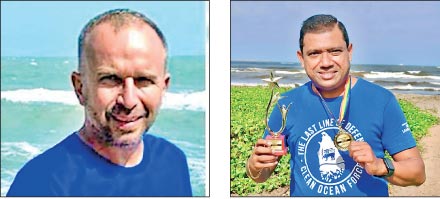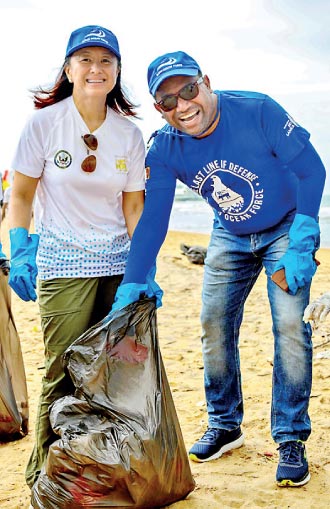Wednesday Feb 18, 2026
Wednesday Feb 18, 2026
Thursday, 18 July 2024 00:51 - - {{hitsCtrl.values.hits}}

 Sri Lanka’s beaches are legendary – pristine stretches of “Thambapanni,” as the ancients called it, meaning “copper-coloured sand,” lapped by turquoise waves. But a few years ago, in 2020, Jerome Fernando walking on the beach with Thorsten Knekties, who was on a business visit to Sri Lanka, stumbled upon a different reality—a beach marred by plastic, debris, and overflowing garbage.
Sri Lanka’s beaches are legendary – pristine stretches of “Thambapanni,” as the ancients called it, meaning “copper-coloured sand,” lapped by turquoise waves. But a few years ago, in 2020, Jerome Fernando walking on the beach with Thorsten Knekties, who was on a business visit to Sri Lanka, stumbled upon a different reality—a beach marred by plastic, debris, and overflowing garbage.
The sight was a gut punch for Fernando. Here, amidst the beauty, lay a silent threat to the very ecosystem he dedicated his life to protecting. Dismay quickly turned into resolve. On that Sri Lankan beach, under a sky filled with disbelief from some and cautious hope from others, Clean Ocean Force (COF) was born.
 Daily cleanups while tackling multidimensional poverty
Daily cleanups while tackling multidimensional poverty
The idea of daily cleanups was met with scoffs and furrowed brows. It was seen as a relentless fight against a seemingly endless tide of pollution. Yet, COF recognised the cycle of poverty and pollution that trapped marginalised communities living near the beaches. Limited livelihood options sometimes forced them to contribute to the very environmental woes they faced.
Instead of viewing these communities as a problem, COF saw them as potential partners. By offering opportunities, COF created a 200-strong workforce dedicated to cleanups. This wasn’t just about aesthetics; it was about collecting vital data on pollution trends and empowering these communities, particularly women who are often the sole breadwinners, to become environmental stewards.
“Daily cleanups are essential,” says Clean Ocean Force Co-Founder Jerome Fernando. “‘Local communities’ morning volunteering makes a huge difference. They come out every morning and volunteer for two to three hours, hand picking and sorting items for recyclers to collect.”
Today, COF is not just cleaning beaches; it is creating livelihood opportunities, uplifting communities, and inspiring a national movement for a sustainable future.
Public-private partnerships for progress
Clean Ocean Force’s impact extends far beyond the beaches, reaching into canals, waterways, mangroves, and even the seabed. This is possible, according to Jerome, due to COF’s valuable public-private partnerships.
COF’s journey began with the support and guidance of the Western Provincial Governor, Marshal of the Air Force Roshan Gunathilake, and a Memorandum of Understanding (MoU) with the Western Province and the Marine Environment Protection Authority (MEPA). This enduring MoU, now in its fourth year, remains a cornerstone of COF’s success.
The public sector partnerships have now expanded to central, sub-central, and local governments. International well-wishers, and diplomatic missions such as US embassy and the embassy of the Kingdom of Netherlands, stand alongside COF in its mission for a cleaner environment.
A multitude of private sector partners also support COF’s cause while fulfilling their CSR duties. These include Coca-Cola, Hemas Holdings, Lion Breweries, HNB, NDB Bank, Deutsche Bank, Rockland, Morison’s, Stretchline, Caravan Fresh, Alumex, Sailpalma and many other corporates and private sector organisations.
COF is deeply grateful for this collaborative spirit that fuels its ongoing success. “Without our partners’ support, our efforts will not be sustainable,” Jerome says with gratitude.
Five years of impact through a comprehensive strategy
COF’s operations have grown significantly since its inception. Its “Pentagon Model,” aligning with 10 of the UN’s Sustainable Development Goals (SDGs), forms a comprehensive strategy that tackles various aspects of marine pollution through awareness creation, advocacy, empowerment, and daily cleanups across beaches, lagoons, waterways, canals, underwater environments, and villages. Poverty alleviation, youth empowerment, underwater restoration, creating circular economies, and educational programs are integral parts of COF’s approach. The 6R’s Model – Recycle, Reuse, Reduce, Reject, Replace, Recommend – along with their 3A Model – Advocacy, Awareness, Action – ensures a multi-faceted attack on the issues of marine pollution and community empowerment.
COF played a pivotal role in advocating for marine pollution policies, leading to the amendment of the National Oil Spill Contingency Plan (NOSCOP), a crucial action plan for governmental organisations in the event of a maritime disaster. Educational programs nurture a generation of ocean protectors, while advocacy campaigns push for stricter regulations on plastic use and waste disposal.
What began in the Western Province has expanded to five provinces: Western, Northern, Eastern, Southern, and North Western. COF has defied the naysayers, removing over 400,000 kg of trash and transforming a dream into a force for positive change.
Mission and vision for the future
COF’s mission is to combat marine pollution through awareness campaigns, educational programs, and advocacy efforts. Designated by the United Nations Environment Programme (UNEP) as the sole entity in Sri Lanka to conduct the “Tight Turners Plastic Challenge” (TTPC) certificate program, COF equips young people with the knowledge and tools to combat single-use plastic.
As COF celebrates this milestone, its journey is far from over. Looking ahead, COF plans to expand its reach, inviting interested parties to join hands in a sustainable pollution prevention model. Its vision is a plastic-free Sri Lankan coastline, restored ecosystems, and empowered communities. This includes establishing a collection network and a Material Recovery Facility (MRF) to create a closed-loop system.
A call to action
Clean Ocean Force Lanka emphasises that even a small amount of litter can quickly accumulate, spoiling the beauty of the beach and harming wildlife. Jerome Fernando said: “I’m not an activist, but a game changer and a visionary who believes in taking initiatives and creating partnerships for goals in marine restoration. We invite corporates, public partners, and environmental stakeholders to join us in keeping Sri Lanka pristine. We aim to extend our initiative to encompass the entire coastal belt, mangrove reservations, and the heavily polluted coral reefs and seabed of Sri Lanka. Our medium-term plan includes establishing our own collection network and a Material Recovery Facility (MRF).”
With every beach cleaned, every life empowered, and every voice raised, COF is making Sri Lanka’s – and thereby the world’s – oceans cleaner, healthier, and hopeful.